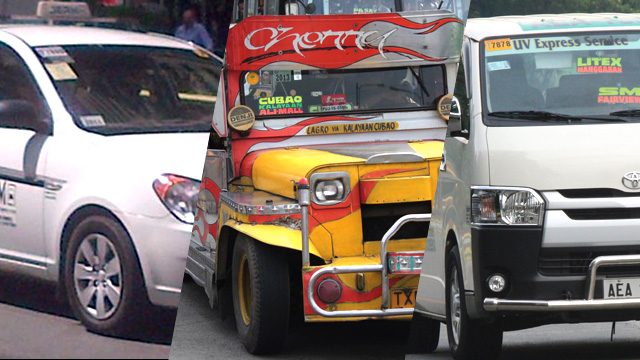SUMMARY
This is AI generated summarization, which may have errors. For context, always refer to the full article.

MANILA, Philippines—”Kung puwede sa kanila, bakit ‘di puwede sa amin (If they are allowed, why not us too)?”
This is the question of public utility vehicle (PUV) groups to the Land Transportation Franchising and Regulatory Board (LTFRB) after it put off the apprehension of undocumented Grab and Uber drivers until it decides on appeals filed by the transportation network companies before the office.
The apprehensions were supposed to start when the LTFRB order against Grab and Uber drivers without permits takes effect on July 26.
“Ang treatment dapat ay pareho. Kung papayagan nila na ang Grab and Uber na bumiyahe na walang prangkisa, dapat ‘yung iba din, provided na merong request,” said Jun Magno, president of the Stop and Go coalition.
(The treatment should be the same. If they allow Grab and Uber to go on trips without a franchise, others should be allowed to, provided that they have pending requests.)
He also said that while some commuters prefer Uber and Grab because of the reliability of their services, this should not allow the companies to flout the law.
“‘Wag ‘nyo sabihing reliable. Hindi naman ibig sabihin porke reliable ka lalampasan mo ang batas. (Don’t cite reliability. Just because you’re reliable doesn’t mean that you can go beyond the law),” Magno said.
The Philippine National Taxicab Operators Association (PNTOA) tagged the LTFRB’s move as an “accommodation” of the popular transportation network companies (TNCs).
“Obviously, Grab and Uber’s was a blatant violation of accountability…Sa akin nga what if ‘yung blatant violation, what if kami bigla na lang naglabas without a franchise?(On my part, what if there is a blatant violation, what if we were to also send out [vehicles] without a franchise)?” said PNTOA president Bong Suntay.
Question of fairness
Suntay also called out the LTFRB for setting up a one-stop shop for transport network vehicle services (TNVS) or ride-hailing service providers even though they also have applications that have been pending “for years.”
According to Suntay and Magno, the TNCs can easily “circumvent the law” because they are online.
For them, the TNCs need to limit their volume of drivers and give them a route measure capacity (RMC) which sets a maximum number of operators. (READ: Taxis beware: Gov’t introduces 4 new transport categories)
The LTFRB has been consulting the TNCs on this, but has had a hard time as there are “dual citizens” that serve both Grab and Uber.
The LTFRB had also received reports that TNVS operators sell or transfer franchises, birthing new names that remain unregistered.
The transport group chiefs also urged the LTFRB to further police pricing as so far, Grab and Uber have their own software to compute each fare.
LTFRB has regulated this by putting a cap on the surge pricing, but Suntay and Magno said they also want a transparent price computation the same way as taxis use meters, or jeepneys add a peso for every additional kilometer.
The groups’ call for a government clampdown on the TNCs was strongly criticized by netizens who slammed poor public transportation services.
A trend on Twitter called out government inaction for allowing the TNCs’ application documents to pile up, and criticized the safety and reliability of PUV operators with commute horror stories.
An online petition also gained ground, garnering 100,000 supporters backing Grab and Uber drivers, and calling on the LTFRB to lift its moratorium in accepting new TNVS applicants. – Rappler.com
Add a comment
How does this make you feel?
There are no comments yet. Add your comment to start the conversation.